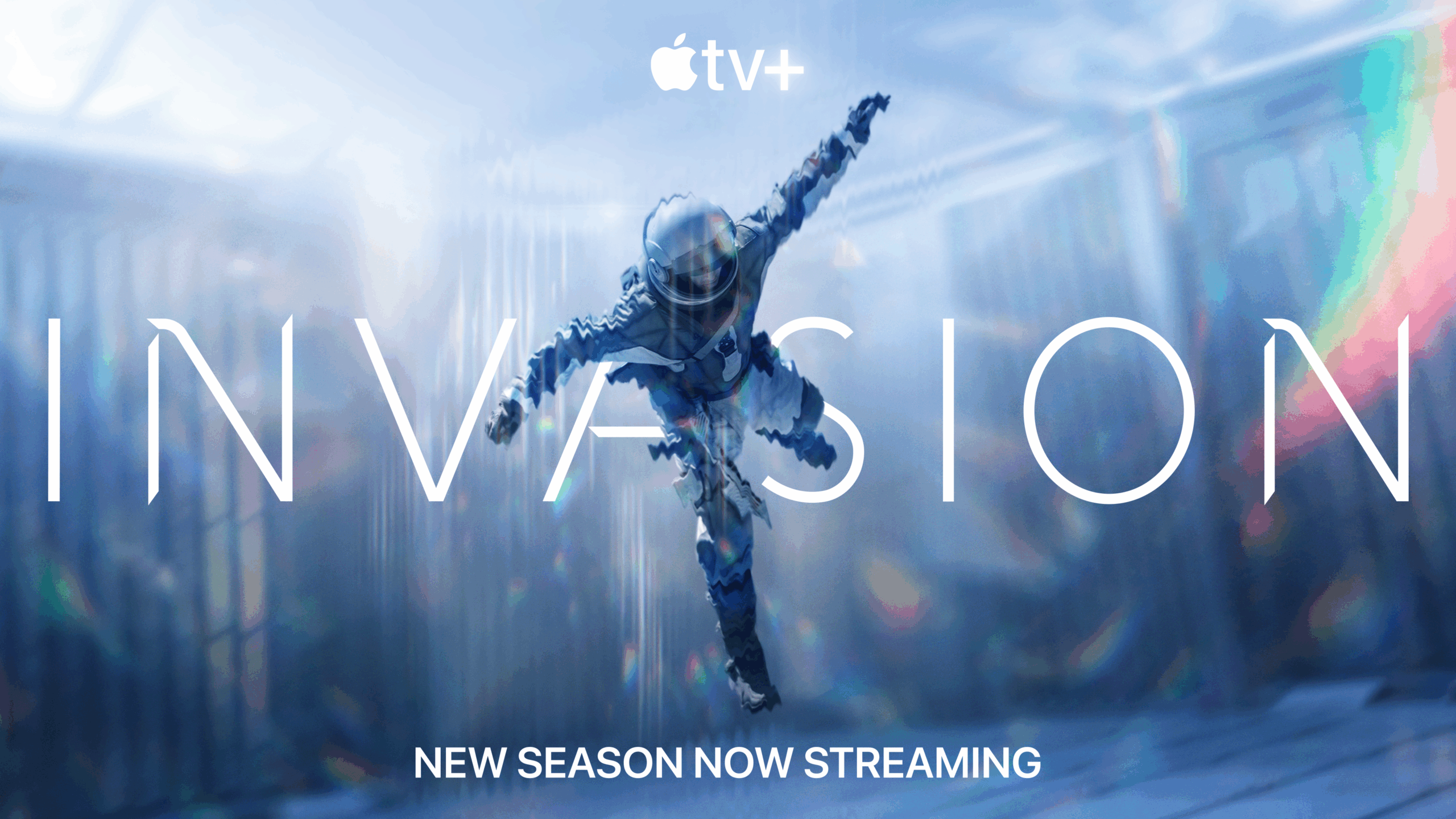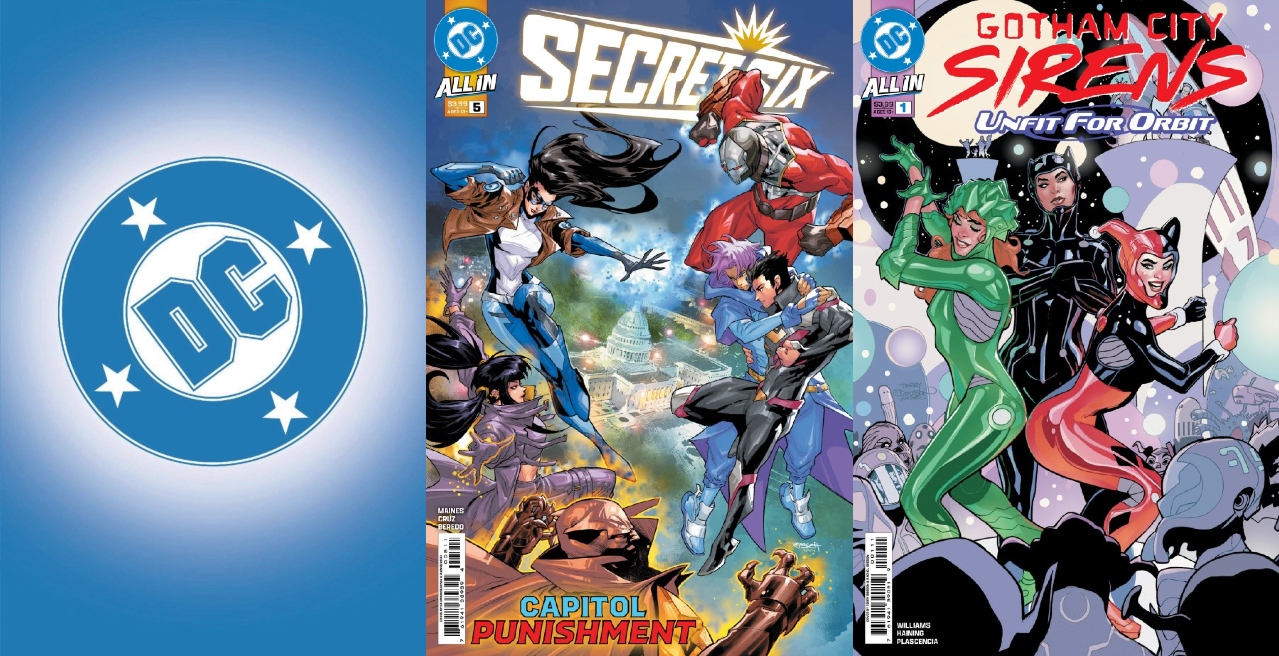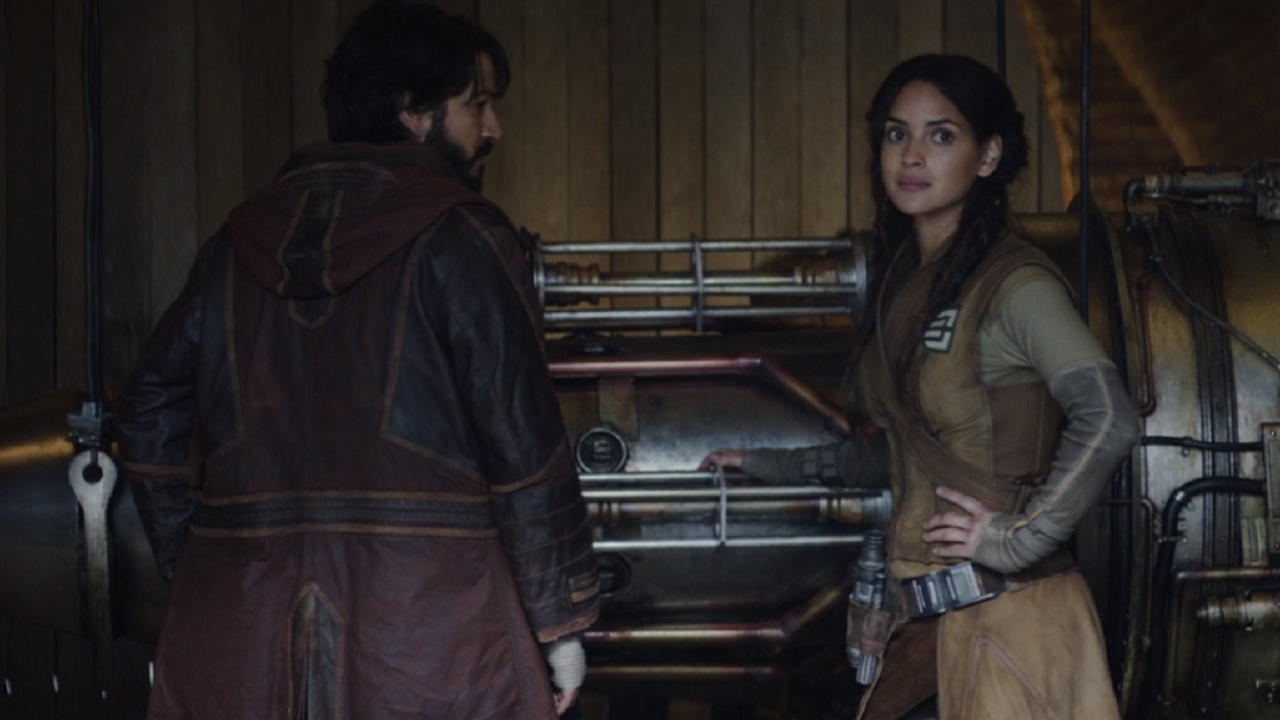Social media has consumed our way of life that it has lead to a new form of celebrity. What was once a status that was just for actors and athletes has now opened to anyone. Have a video go viral and you will gain fame for a short period of time. Keeping up with that fame on social media means that you have to create content that will stand out from the millions and millions of other content out there. In the movie Infamous, starring Bella Thorne and Jake Manley, we see what one person is willing to do to keep that fame, including breaking the law. This movie highlights a part of our society that is dominated by the addiction of social media and what people are willing to do for a little fame. I was able to speak with the writer and director of Infamous Joshua Caldwell, on combining social media with a heist film.
Nancy Tapia: Great. Well, let’s talk about Infamous. You had a full load as writer and director. Tell me the beginning from the writer perspective, why this topic?
Joshua Caldwell: I was kind of interested in doing a heist movie and I just started researching. At some point you start to hit all the people doing heist and Bonnie and Clyde up here. I naturally gravitate towards female-driven material. I’d say at least my last three of my last four features have been female driven. So I naturally gravitate towards that. I felt, oh, was there sort of a modern take on Bonnie and Clyde, where I can really root you in the family aspect of it? And make her sort of the instigator. I had seen years ago a photo of this young, good looking, couple being arrested by LAPD. The woman was blonde and she was smiling and in the photograph she was smiling at her boyfriend, leaning in for a kiss or pulling away. I was just that kind of sexy, new, modern Bonnie and Clyde, it’d be interesting. I kind of just filed it away. And I’ve been exploring the heist and sort of retelling of Bonnie and Clyde.
Feeling like it’s been a while since anybody did anything that was kind of a comment on what Bonnie and Clyde really were. Which were some of the first major celebrities in America, the myth defining cries really broke up by newspapers wanting to sell… Or the media wanting to sell newspapers. I just felt like well, what’s the modern version of that? So, I felt that the intersection of social media, celebrity and its currency of likes and follows, intersecting that with violence and crime kind of felt like a natural, inevitable fit. America’s own has been fascinated by crime, outlaws, it has always been a thing here. The unique thing about our present day situation with the media is it used to be that they were gatekeepers, that decided who was going to be on. Who was going to be interviewed and put on 2020? Who’s going to do this? Who’s going to be put on the front page? And that doesn’t exist anymore.
With nothing more than a phone, everyone and anyone can create and build and reach an audience in the tens of millions. And they never have to step out from behind their phone to do it. So I was really fascinated by that collision of celebrity and crime. And I wanted to explore that in the most extreme, in your face, aggressive way that I could. Which at the end of the day, doesn’t feel all that extreme.
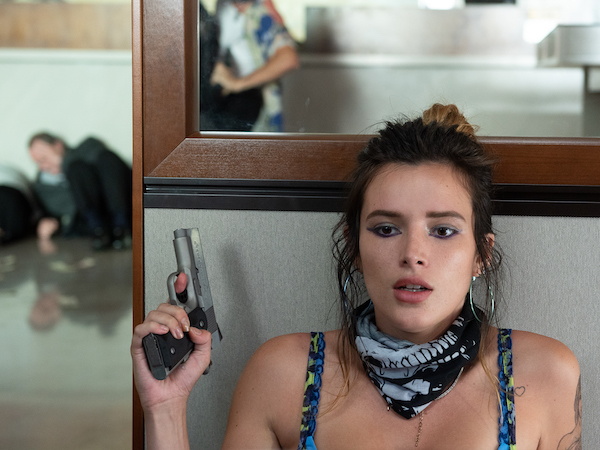
Nancy Tapia: Yeah. That’s a really strong topic today. People exploiting social media for a bit of fame or some sort of personal recognition or leading on to being a social media influencer.
Joshua Caldwell: Well, it’s the new currency, right? It used to be, I want to get onto a reality show or I’ll do Road Rules or the Bachelor or whatever. Now you don’t even need that, right? In fact, you’re probably hurt by it. And you would be if you’re on social media. So, it’s just the likes and the follows are the new currency in a way that it’s psychologically more intense than the money. I mean, I remember there was an article that came out a couple of years ago about these influencers who were having trouble getting jobs, because of the content that we’re putting online. There’s a fascinating movie on Netflix called American Meme that goes into the world of important social infatuation and these other people in the way they’re driven by that response, right? It’s like gambling. I mean, it’s such a thing that Instagram changed the algorithm so that you no longer saw how many people like the post. It’s clearly a thing going on.
I just felt like as we were writing it and coming up with it, I just felt like we’re reaching a point where people are doing more and more extreme things in an effort to get a response in people, right? And you become desensitized to the earlier stuff and now you need to do more and more and more. You need to keep your audience happy. You need to be crazier and crazier. I mean, there was an influencer that was just arrested for looting a mall or being present at looting a mall and filming it and putting it up on social media. So, I think we’re all a part from this. I just became interested and excited in the prospect of putting this on screen and putting you… not doing it in a sort of objective judgy way, right? But I’m doing it in a way that’s a subjective view, it is a very subjective experience that you, as an audience member, were experiencing Arielle’s Instagram feed, you’re experiencing her.
So, the movie is her social media feed, and you’re seeing things the way she wants you to see it. You’re seeing things in a way that she would be presenting them to you if she was real in real life. Frankly, I think that if this were happening in real life, all of us would be following.
Nancy Tapia: That is so true, especially today.
Joshua Caldwell: Especially today. I mean, there’s so many examples of that collective online, either joining up or outrage or whatever. I mean, it moves very quickly. And I think that what’s really interesting about it is that all that matters at the end of the day is the metric. So, if 80 million people are following you, even if half of those people are fake, of the remaining half, half of those are fake following you. The other half are like following you. None of that matters because it’s not a qualitative experience, it’s a quantitative experience. In fact, in some ways of outrage and bad press and being aggressive and in your face can also gain you more followers. Because they’ll tweet you, they’ll retweet you, how nuts this person is. I hate this guy. Look how racist this person is. But at the same time, you have to do that if you’re giving value to that profile.
Nancy Tapia: Right.
Joshua Caldwell: Because it’s a purely metric based, it’s a purely numerical, qualitative or a quantitative-based system. And that’s really fascinating. And in a way, that’s what I tried to explore in the movie.
Nancy Tapia: Let’s talk a little bit more about the movie… Was Infamous your original title?
Joshua Caldwell: It was not. It was really Southland. And what’s pumped out with digital released movies, the title will often change because they’re trying to look for something that’s instantly explainable and recognizable. And so Southland is kind of cool and unique or if you’re on iTunes and you see something that says Southland, and Bella holding a gun. That is as good of an explanation as Infamous, right? And so, I’m happy with the title as it is because it speaks to the movie and it is. I mean, there’s so many… Infamy or fame, it almost doesn’t matter.
Nancy Tapia: Yeah, definitely a good choice. Let’s move on with the cast. How did you go about getting Bella and Jake involved? They have awesome chemistry on the film.
Joshua Caldwell: Yeah. I love the chemistry between the two. Bella got involved with my producer. She sent her manager the script. She was looking for projects from young writer, directors. She was looking for stuff that was different and aggressive, and it seemed to fit the bill. So, very early on, she read the script, she loved it. We had a call and she jumped on board. And that was about a year before we started shooting. And so we had a lot of time together to really develop the character and get to know one another. And I got sort of a peek into her world, which is insane. And then as we got… Started getting closer to production and the budget started coming together, we started looking for our Dean. And found him in Jake. And Jake was somebody I was not as familiar with, but really loved his work and his vibe. And more importantly, he was somebody who, again, loved the script, but was eager to do whatever needed to be done, right? I mean, he was the one who said, “Hey, I’m going to dye my hair.” I said, “Great.”
He was excited to jump in and learn how to use weapons. And we got him in touch with an ex-con who had spent time in prison when he was younger and came out and developed the experience. And what is that like for somebody coming out? So, it was great. And the experience, it’s funny because the chemistry, they had some conversations. But the chemistry was something that we just really came together on set. I mean, they didn’t have a lot of time prior to shooting because I was in Europe and Jake was on another show. And until they really just did it, and that was so much fun to watch. And just to be able to feel that, you really feel the chemistry on set and in the movie.
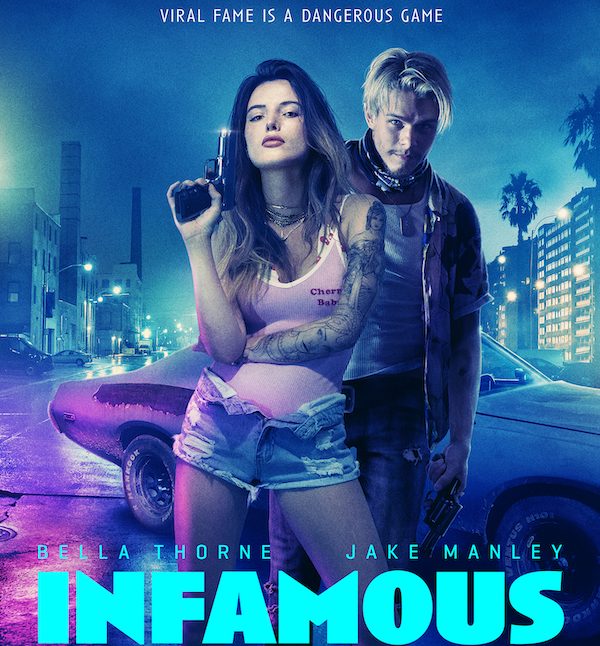
Nancy Tapia: Let’s discuss your role as a director and the camera work. Because a lot of the scenes weren’t just your usual camera view. Some scenes were as a Instagram live during the robberies. How did that get done?
Joshua Caldwell: Well, one of the things about cine cameras is they’re big and they’re tough to move around and you really have to provide lighting. And we certainly wanted it to have… The discussion with Eve, my DP, we really wanted it to have a cinematic look. But I tend to gravitate towards hand-held. And specifically in this movie, I wanted to film a lot of what you saw online, especially with these day-in-the-life blogs, where people are holding their cameras and they’re skateboarding down the street, and they’re showing you around. And it’s a very Gonzo sort of documentary-like deal. And we wanted to capture that. We wanted it to be really bright, poppy because we live in a filtered world now. Everybody’s used to it. We really wanted to mimic the way that Instagram really brings out the color and the saturation and the contrast. And then, the thing I also wanted to do was, I didn’t want to do the fake thing where you shoot stuff with the cine camera, and then you make it look like an iPhone. I was like, let’s just shoot it with an iPhone.
Audiences are used to seeing stuff shot on iPhones. So, it’s not like in quality wise it’s not that far off. It’s clearly different, but it’s still not a low-res image to upload. Again, we, Eve and I really wanted to ground you in a subjective experience. We really wanted you to see everything from Arielle’s point of view. And that included seeing stuff through the phone. The advantage we got was we were able to also shoot a ton of material. Because on the iPhone you’re not waiting for it. I mean, I was driving to set shooting sunset, sunrises and bridges. And all this kind of stuff because I knew that we would have these montages in the movie. And I knew that we were going to need material. Shooting that stuff on a tight schedule with a cine camera, it never gets done. It’s always the thing that goes away. It gave us the advantage of being able to capture a lot of stuff, that we also not only able to cut down into a very tight, exciting montage.
But it really came from saying, I just really wanted to grab you in the subjective experience of Arielle. And attach the camera to her. So, you were with her… You’re picking her up in the beginning and you were with her on that ride.
Nancy Tapia: At the end, you’re like everyone else watching. You’re a fan and just waiting to know what’s next.
Joshua Caldwell: Right. And you’re either a fan or you hate her guts, right? But at the same time, it doesn’t matter because you tuned in.
Nancy Tapia: Yes.
Joshua Caldwell: That’s all that counts is that metric, and it doesn’t matter. I mean, that’s the thing at the end of the day for Arielle, she doesn’t care why people are following. She just cares that people are, because the alternative is having nobody paying attention to you. And I feel like for some people that’s worse than death. And so rather than sort of give her her comeuppance, I mean, she’s obviously going to jail. But we gave her the win, because I think that happens. I think that happens. People tune in, they like her because she’s been given a voice and given a platform and given that support. And that’s a little scary, but at the same time, that felt right to put in the movie. That’s kind of what… A little bit of an FU to everyone expecting her to die or to lose, but she doesn’t. She doesn’t see it that way. That’s sort of where you get in that full delusion, a branch with that character and what she got. She doesn’t care that she’s going to jail because millions of people know who she is.
Nancy Tapia: To finalize, is there something you can share that you may be working on?
Joshua Caldwell: Well, I got a couple of things in development. There’s a book that we’re going to be announcing soon, so I can’t say what it is. But there’s a book that I optioned that exists in the same world. Then I’ve got another project that we’re about to cast on. Nothing immediate and obviously one of the challenges with COVID is not knowing when everyone’s going back to work. So, I’m trying to zero in on what that next thing is going to be. But I don’t have anything that I can say this is definitely it. So, yeah, COVID is becoming an interruption to that. So, there will be something soon, I hope and probably very different from Infamous.
Nancy Tapia: Great. We’ll definitely be in tuned for that and congratulations for Infamous now.
Joshua Caldwell: Thank you so much. I really appreciate you taking the time.
You can watch Infamous on Apple TV link by clicking here
Also Check Out: Odessa Young Talks About The Intense Nature Of The Film Shirley
Continue the LRM Online conversation on Discord by CLICKING HERE!
—–
Have you checked out LRM Online’s official podcast feed yet The LRM Online Podcast Network? This includes our flagship podcast Los Fanboys, our premiere podcast Breaking Geek Radio: The Podcast, GeekScholars Movie News, and our morning show LRMornings. Check it out by listening below. It’s also available on all your favorite podcast apps!
Subscribe on: Apple Podcasts | Spotify | SoundCloud | Stitcher | Google Play

 FOR FANBOYS, BY FANBOYS
Have you checked out LRM Online’s official podcasts and videos on The Genreverse Podcast Network? Available on YouTube and all your favorite podcast apps, This multimedia empire includes The Daily CoG, Breaking Geek Radio: The Podcast, GeekScholars Movie News, Anime-Versal Review Podcast, and our Star Wars dedicated podcast The Cantina. Check it out by listening on all your favorite podcast apps, or watching on YouTube!
Subscribe on: Apple Podcasts | Spotify | SoundCloud | Stitcher | Google Play
FOR FANBOYS, BY FANBOYS
Have you checked out LRM Online’s official podcasts and videos on The Genreverse Podcast Network? Available on YouTube and all your favorite podcast apps, This multimedia empire includes The Daily CoG, Breaking Geek Radio: The Podcast, GeekScholars Movie News, Anime-Versal Review Podcast, and our Star Wars dedicated podcast The Cantina. Check it out by listening on all your favorite podcast apps, or watching on YouTube!
Subscribe on: Apple Podcasts | Spotify | SoundCloud | Stitcher | Google Play

